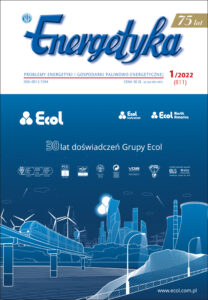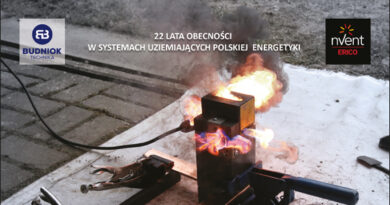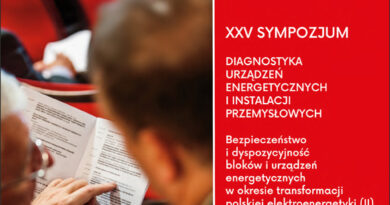January 2022, Issue 1 (811)
TABLE OF CONTENTS
Jan STRZAŁKA
Kalendarium życia i działalności profesora Kazimierza Bisztygi
Stanisław PIRÓG, Zbigniew HANZELKA
Profesora Kazimierza Bisztygi przygoda z elektrotechniką
Wojciech STANEK
Thermo-Ecological Cost (TEC) – evaluation of energy-ecological efficiency of energy technologies
BULLETIN OF PPTE2050
Jan POPCZYK
GRASS ROOTS BUILDING OF THE JST ELECTROPROSUMERIC ENERGY RESILIENCE
in place of energy safety in the descending governmental energy policy
Krzysztof BODZEK
ANALYSER OF THE JST ELECTRPROSUMERIC PROCESS RESILIENCE
Building of JST transition trajectory to electroprosumerism
Andrzej JURKIEWICZ
ENERGY AUTONOMISATION OF SUB-MUNICIPALITIES
with the help of micro-scale biogas power plants
SUMMARIES
Wojciech Stanek
Thermo-Ecological Cost (TEC) – evaluation of energy-ecological efficiency of energy technologies
The article presents problems related to the assessment of energy efficiency of energy systems. In practice, local energy efficiency is used to evaluate these systems, which is not a correct criterion for coparison different energy technologies. For the correct assessment of efficiency, a system analysis in the global balance boundry should be used. System analysis tool is discussed – thermo-ecological cost (TEC) – which is a correct measure of energy and ecological efficiency. Problems with the correct application of the energy and environmental efficiency assessment are illustrated with examples of results on non-renewable and renewable energy sources.
Keywords: comparison of efficiency of energy technologies, system analysis – tehrmo-ecological cost, correct assessment of energy-ecological efficiency
Jan Popczyk
GRASS ROOTS BUILDING OF THE JST ELECTROPROSUMERIC ENERGY RESILIENCE
in place of energy safety in the descending governmental energy policy
If, in the end of the year 2021, the Polish WEK-PK(iEJ) power industry crashed into a reinforced concrete wall (a year earlier it had only been a brick one) we must definitely conclude that it was a wall being the bifurcation point of the energy transition. In other words, the Polish state lost forever credibility to be the energy safety guarantor i.e. it was no more able to fulfil the subsidiarity principle with regard to energy needs of citizens and the state economy. Therefore, the reinforced concrete wall definitely closed the future of the current energy systemic order in Poland and opened the new one (and it is of no importance that this new order has not yet been formally accepted). This process can no longer be reversed either by the present government or by any other – full stop, finished. And no self-government (JST community) is anymore able to discharge itself of responsibility for the grass roots building its electroprosumeric energy resilience. But this cannot be realised in any other way but in the order of a social market economy. Moreover, self-governments have three decades to build their target JST electroprosumeric resilience. During this time nobody can discharge the state from the controlled, in the descending mode, phasing-out of the WEK-PK(iEJ) energy industry. This in turn cannot be done except through competition (in the real time market) taking place on a critical virtual control front-end between systemic (legal) orders – the old and the new one – in the electric energy market. In this context, the article focuses on the grass roots own tasks of the PPTE2050 platform environment. They are tasks transforming in the year 2022 the concept of energy transition to electroprosumerism, behind the bifurcation point, into plans to build the JST electroprosumeric resilience. In addition these plans include the initial verification of the 2021 concept in frames of study works on Territorial Just Transition Plan for Wałbrzych Region (benefitting from the coal region status granted by the European Commission) and on the model of the Capital City of Warsaw energy transition to electroprosumerism within the 2050 time horizon. Except this, the plans include emerging cooperation between PPTE2050 and the Parliamentary Group for Electricity Act as well as the cooperation with the Silesian Union of Municipalities and Districts in the framework of training in 2022 the specialists in the field of the JST electroprosumeric resilience.
Keywords: energy industry, transition, Electricity Act, self-governments, electroprosumeric resilience
Krzysztof Bodzek
ANALYSER OF THE JST ELECTRPROSUMERIC PROCESS RESILIENCE
Building of JST transition trajectory to electroprosumerism
Energy transition in the breakthrough innovation mode will require a range of local actions independent on the actual regulatory frameworks. These actions should be realised with the support of local government entities (JST) which role in the transition process substantially increases and, at the same time, also increase requirements for them in the range of understanding the electroprosumerism. In particular, this applies to requirements concerning the ranking of activities enabling achievement of JST electroprosumeric resilience in a reasonably short period of time and including the criteria of electroecological cost (in environmental dimension) and the cost of meeting the energy needs (in economic dimension). The electroprosumeric process resilience analyser is a tool that enables rapid analysis of a possibility to realise the transition to electroprosumerism in a JST front-end (for this purpose, a set of reference trajectories is used in the analyser). It is a tool addressed to self-governments which in the crisis mode faced already the challenge of developing electroprosumeric resilience not only in he range of their own tasks but of all communities within JST units. The effect of the analyser functioning is the structure (mix) of manufacturing technologies which after implementation of the four electroprosumerism markets will ensure meeting of all inhabitants energy needs.
Keywords: transition trajectories, electroprosumerism, self-governments, electroprosumeric resilience
Andrzej Jurkiewicz
ENERGY AUTONOMISATION OF SUB-MUNICIPALITIES
with the help of micro-scale biogas power plants
Energy self-sufficiency in electroprosumerism markets – comprising the closed-loop economy (GOZ) – should be the objective of every self-government actions in Poland. Described is here the method to realise energy self-sufficiency in a sub-municipality of up to 1000 inhabitants and supplied from the national power system (KSE) – by LV lines connected to a single MV/LV transformer substation – and a 10-200 kW biogas microplant. The basis of this technological solution – apart from the biogas micro power plant itself – is also passivation of residential buildings, heating electrification with the use of heat pumps, roof PV systems and an adequate energy management system (SZE); so far, the transport electrification has not yet been taken into account. Complementary (additional, possible) components of this solution comprise battery containers of electric energy (biogas) – temporarily also motor power generators – guaranteeing the individualised electroprosumeric emergency resilience for every household in a sub-municipality.Presented here the process of building the sub-municipality energy self-sufficiency (its autonomisation relative to KSE) – in other words building of a sub-municipality emergency resilience replacing energy security not ensured already by KSE – is realised in stages: on grid – on/off grid – off grid. Sub-municipalities autonomisation relative to the KSE (achievement of their own emergency resilience) is now in our country technically feasible and realisable in a short-time period (for an individual sub-municipality that period should be no longer than a few years). On a national scale the autonomisation can be accelerated by the use of the KSE resources collective use principle (put into effect by a proper pilot act to the Electricity Act). But a matter of fundamental significance is to launch the factory production of micro biogas power plants in the MSMEs sector. Given is also an information on eGIE activities in this field.
Keywords: energy transition, off-grid sub-municipality, micro biogas power plant




